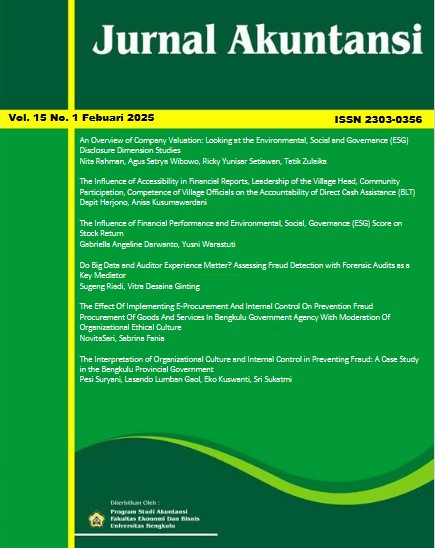Isi Artikel Utama
Abstrak
This study explores the factors contributing to fraud in the public sector through the lens of the Pentagon Theory and examines how organizational culture and internal control play a role in preventing fraud in government institutions. A qualitative approach with a case study method was employed, focusing on government agencies within the Bengkulu Provincial Government. Data were collected through in-depth interviews with employees and document analysis related to internal control systems. The findings reveal that weak organizational culture and ineffective implementation of internal controls are the primary factors that create opportunities for fraud. Additionally, pressure and rationalization within the bureaucratic environment further drive individuals to commit fraudulent acts. Moreover, the low expectation of punishment for fraud perpetrators exacerbates the situation and weakens existing prevention mechanisms. These findings reinforce the Pentagon Theory by highlighting the significant role of organizational culture in fraud prevention. Therefore, government institutions must strengthen integrity-based organizational culture and enhance the effectiveness of internal controls to mitigate fraud risks. This study emphasizes the interpretation of organizational culture within the context of the Pentagon Theory and underscores the critical role of internal control in fraud prevention in the public sector, particularly in local government environments.
Rincian Artikel
Hak Cipta (c) 2025 Pesi Suryani, Lasando Lumban Gaol, Eko Kuswanti, Sri Sukatmi

Artikel ini berlisensiCreative Commons Attribution-ShareAlike 4.0 International License.
Author retains the copyright and grants the journal the right of first publication of the work simultaneously licensed under the Creative Commons Attribution-ShareAlike 4.0 License that allows others to share the work with an acknowledgement of the work's authorship and initial publication in this journal
Author is able to enter into separate, additional contractual arrangements for the non-exclusive distribution of the journal's published version of the work (e.g., post it to an institutional repository or publish it in a book) with the acknowledgement of its initial publication in this journal.
Author is permitted and encouraged to post his/her work online (e.g., in institutional repositories or on their website) prior to and during the submission process, as it can lead to productive exchanges, as well as earlier and greater citation of the published work (See The Effect of Open Access).
Creative Commons Attribution-ShareAlike (CC BY-SA)
Jurnal Akuntansi is licensed under a Creative Commons Attribution-ShareAlike 4.0 International License.

